An unnatural link is a common trick used in black hat SEO to sneak past Google's regulations and give a website's search rankings an unfair boost.
If we asked Google for a definition of an unnatural link, it would likely refer us to its latest Search Quality Rater Guidelines (dated March 5, 2024), which indirectly mention unnatural links as Lowest Quality Pages in item 4.0 of the regulation.
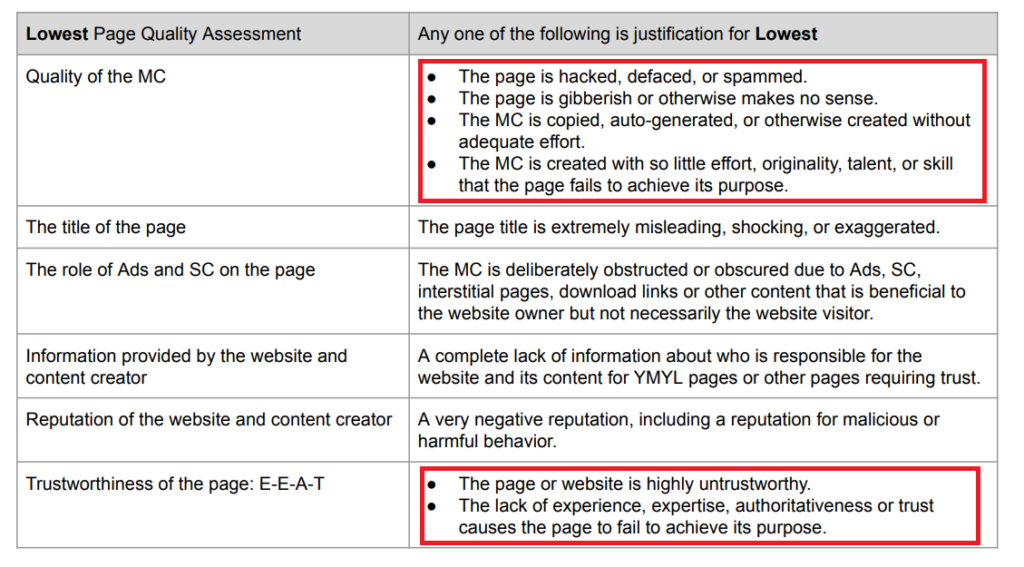
In the same section of the regulation (item 4.6), Google hints that unnatural links could be types of Spammy Webpages made just to help website owners manipulate rankings, namely:
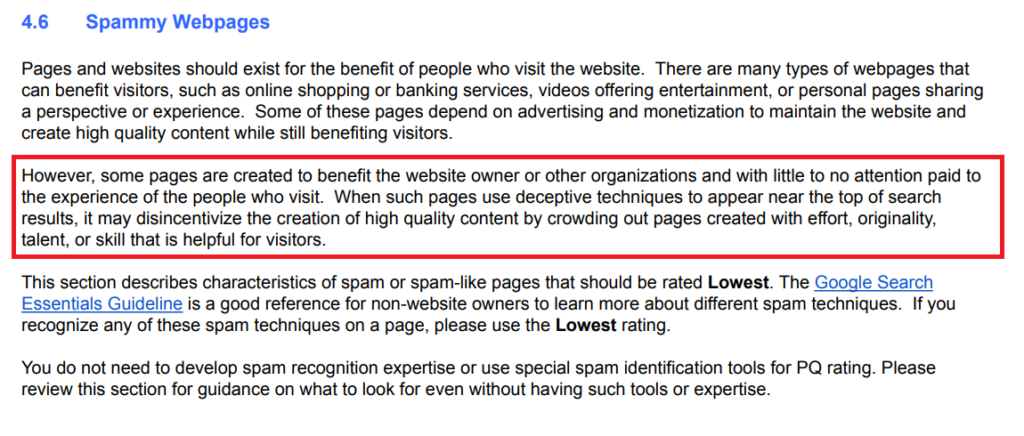
Another reference to unnatural links can be found in Google's current Search Essentials, specifically in their Spam Policies. There, unnatural links are associated with practices like Link Spam and other methods used to manipulate a website's search engine rankings. These include techniques such as cloaking, doorways, hacked or scraped content, sneaky redirects, and more.
Key takeaways:
- Websites with unnatural links offer poor user experience due to irrelevant content and intrusive links, leading to higher bounce rates, lower engagement, and overall low SEO performance.
- Google’s algorithms, starting from April 2012 Penguin Update up to recent March 2024 Core & Spam Updates, were specifically designed to target and crack down on spammy and manipulative link activities.
- Unnatural links account for over 75% of SEO penalties on websites, according to Ahrefs.
- When caught up with unnatural links, websites face Google penalties, both manual and algorithmic, resulting in significant drops in rankings, reduced search visibility, deindexing, and decreased organic traffic.
- With less than 1% of searchers clicking on the second page of Google results, as Backlinko reports, staying at the top means avoiding unnatural links and prioritizing ethical link-building.
- Recovering from a penalty caused by unnatural links can literally take forever. You'll need to do a bunch of things: audit your links carefully, remove any harmful ones, and then submit a reconsideration request to Google.
- Even without penalizing sites, Google may devalue unnatural links, which means your SEO efforts could be wasted. According to Cognitive SEO, 35% of unnatural links have ZERO influence.
What Is An Unnatural Link?
An unnatural link is a backlink with no real relevance or value for the user, created just to artificially boost a site's Google ranking by lulling the algorithms into thinking it's natural.
💡Pro-tip! Google's Webmaster Guidelines (older version of Google's Search Essentials) defines unnatural links as:
- links acquired through deceptive practices
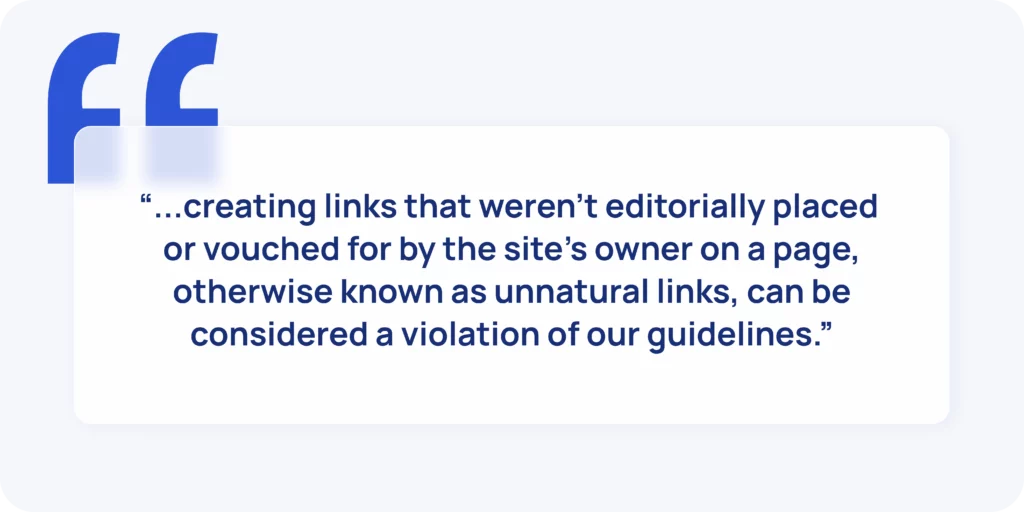
- or, that violate the Google Webmaster Guidelines.
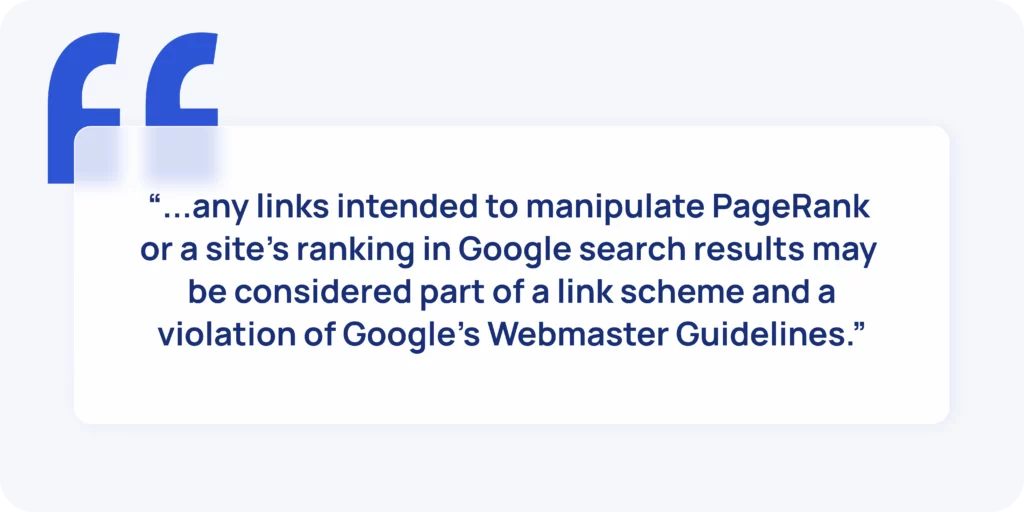
🧐 How to spot an unnatural link?
Here's your handy checklist with basic criteria!
✅ Unnatural links are created using spammy methods
✅ Provide zero value to the reader
✅ Are never organic, often “dealt” through purchasing or exchange
✅ Do not fit the context of the linked website or piece of content
✅ Aren’t placed by the website owner
✅ Exist only to doctor up a website's position or "enhance" its backlink profile
Sometimes, you can spot several signs of unnatural links all in one place, like in this blog post discussing how Chinese police track protesters using cellphone data.
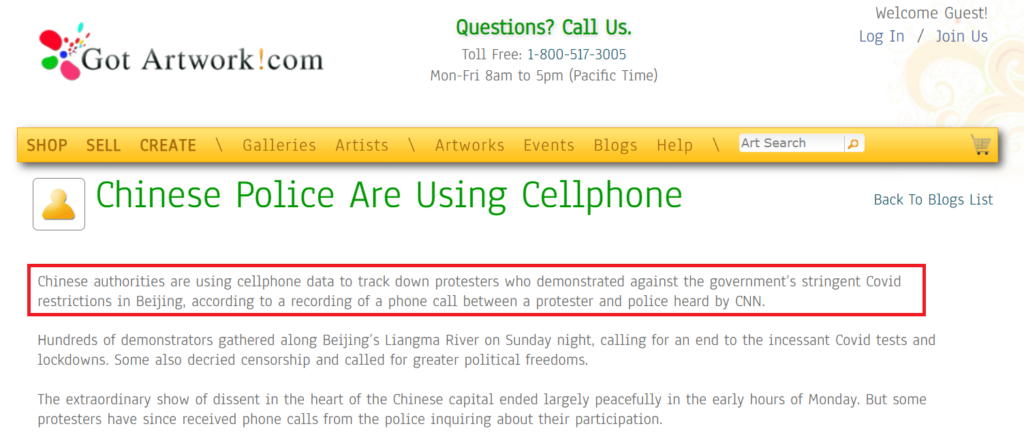
If you scroll to the end of the post, instead of an outro, you'll find a long list of links that are completely irrelevant to the topic discussed, being totally unhelpful for the reader. Not to mention how spammy these links look in the mere wording of the blog post!
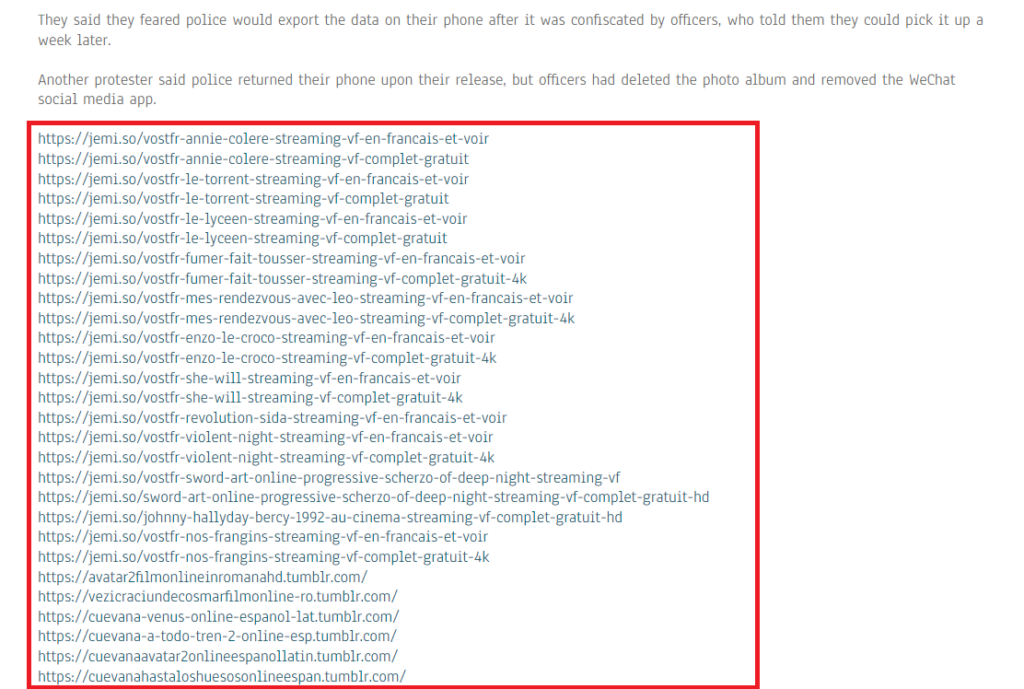
Clearly, without being listed here, you probably wouldn't even consider searching for them! It's an explicitly sneaky tactic for better traffic inflows and rankings.
💡Pro-tip! Unnatural links can be used by competitors in negative SEO attacks to undermine the ranking of a successful website. This tactic involves directing spammy links towards a competitor’s site, intending to trigger penalties from search engines.
See how a website owner reports on links they haven't placed, risking their high Google ranking due to potential penalties.
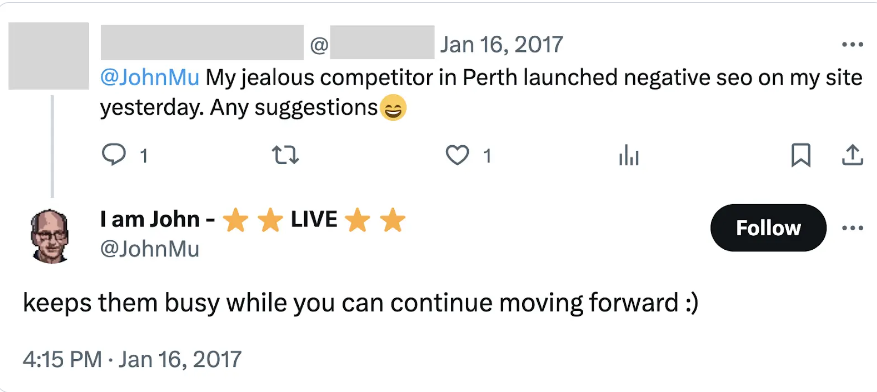
Google penalties for unnatural links
As we mentioned before, Google doesn't let manipulative links slide. Throughout its history, it evolved greatly to crackdown on blackhatters to instill white hat link building techniques within the SEO community.
Basically, Google dishes out two types of penalties when it catches website owners using unnatural links:
Algorithmic penalties
Algorithmic penalties are automatic punitive actions enforced by Google when a website violates its guidelines, such as through manipulative SEO tactics or unnatural links.
Since the early days of PageRank, Google has rolled out several updates that hit hard at black hat SEO tactics, spammers, and anyone trying to boost traffic unnaturally. Remember the classics like Panda and Penguin? They put a stop to promoting low-quality content, duplicates, link schemes, keyword stuffing, and all kinds of spam.
Major Google Algorithm Updates
| Update | Impact |
| Panda | Targets websites with low-quality or thin content, content farms, and those with high ad-to-content ratios. |
| Penguin | Penalizes websites for unnatural backlink profiles, such as buying links, participating in link schemes, or using manipulative linking practices. |
| Hummingbird | Focuses on improving the understanding of search queries to provide more relevant results, rather than penalizing specific practices. |
| Mobile-Friendly | Prioritizes mobile-friendly websites in mobile search results, penalizing non-responsive or poorly optimized mobile websites. |
| Page Layout | Penalizes websites with intrusive or excessive ads above the fold, affecting user experience. |
| Core Updates | Broad updates to Google's search algorithm aiming to improve overall search results relevance and quality, leading to fluctuations in rankings for websites. |
As sneaky tactics evolve, Google's algorithms evolve too. In 2024, Google remains vigilant against low-quality content, spam, link farming, and more, introducing new algorithm advancements like March 2024 Core & Spam Updates. With updates rolling out monthly, the saga continues!
Depending on the type of algorithm, if your site gets hit, you might experience:
✅ Rankings drop
✅ Less organic traffic
✅ Reduced visibility
✅ Business revenue dips for those relying on search traffic
✅ Time-consuming penalty recovery
✅ Decreased credibility with website users
💡Pro-tip! Want to keep up with all of Google’s algorithm updates and stay in the clear? Check out Moz’s complete list!
Manual actions
Manual penalties are punitive actions enforced by Google’s human reviewers when a website is detected violating Google's Search Essentials, particularly its Spam Policies.
💡Pro-tip! Webmasters are usually informed about manual penalties through Google Search Console. From there, they can fix the issues and request a review afterward.
High chances you’ll get a manual penalty if your website is busted with:
✅ Unnatural links
✅ Thin or low-quality content
✅ Keyword stuffing
✅ Cloaking & sneaky redirects
✅ User-generated spam
✅ Site hacking
✅ Hidden texts & links
☝️Did you know?
Penalties for unnatural links have sparked a specialized industry: services that audit and clean up links.
But why deal with the consequences when you can acquire high-quality, relevant links through Editorial.Link? As a reputable link-building agency, we secure relationship-based links from top websites like podium.com, monday.com, namecheap.com, envato.com, and lots more. No penalties, guaranteed!
Why Are Unnatural Links Bad for SEO?
Unnatural linking is detrimental to your website’s SEO because:
⚠️ It's highly unlikely that an unnatural link will escape algorithmic penalties: Google algorithms are DESIGNED to track and eliminate these types of link patterns.
⚠️ Since you can't control constant updates, websites that rely on unnatural links are especially at risk.
⚠️ Unnatural links might give you a temporary spike in rankings, but they usually don't last. In contrast, building high-quality, relevant backlinks can steadily boost your website's authority and visibility over time.
⚠️ Shady links are typically bought or created by spammers and don't accurately reflect the website's REAL SEO performance.
⚠️ Chasing unnatural links can eat up a lot of time and money. It's smarter to invest in high-quality backlinks and genuine SEO tactics that bring long-lasting benefits instead.
⚠️ Users trust search engines to deliver reliable results, so unnatural links can harm a website's credibility by suggesting manipulation rather than genuine ranking merit.
⚠️ Risking your hard-earned brand reputation for just one unnatural link isn't worth it.
⚠️ Unnatural links can lower CTRs and decrease organic traffic because users are less likely to click on search results they see as spammy or manipulative.
⚠️ White label link-building involves forming relationships within the industry or community, while unnatural links miss the chance to build genuine connections and collaborations that can benefit your SEO later on.
Examples of Unnatural Links
Throughout the history of link building, unnatural links have taken many shapes and sizes, evolving from Google's early days up to 2024.
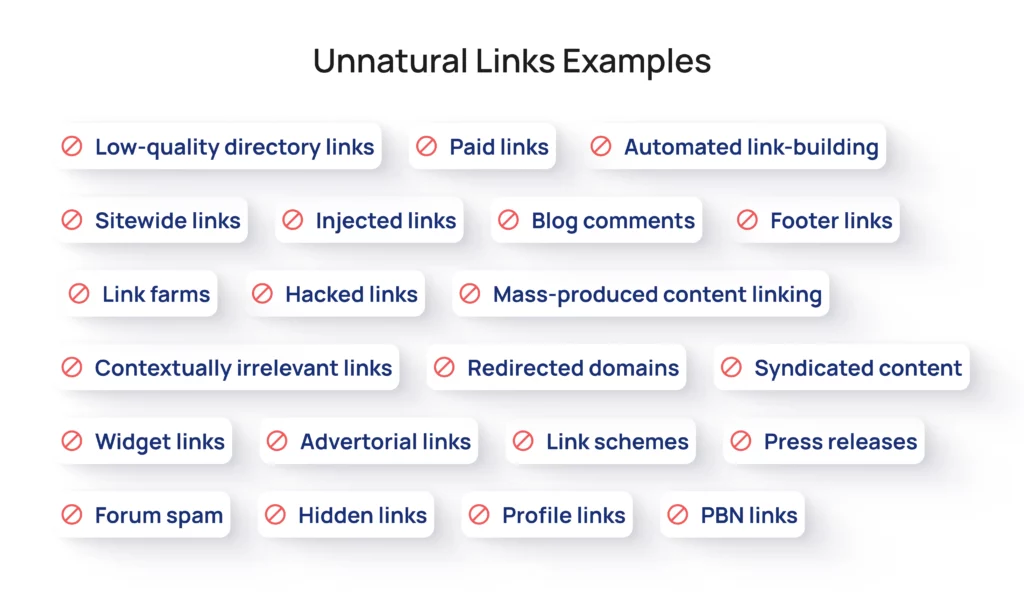
Forum links
Forum links aren't necessarily bad, as they can bring pretty nice traffic that will cost you almost nothing. However, blackhatters are constantly active, selling these links to manipulate the system, which can ultimately result in penalties from Google for being spammy and intrusive.
And there are good reasons to that:
- Forums often have minimal editorial oversight, allowing anyone to post links without a quality or relevance review.
- Many forum links lack genuine value to the conversation and are posted solely to build backlinks.
- Some users mass-post links across multiple forums, aiming to manipulate search engine rankings.
- Forum links often use over-optimized anchor text aimed at boosting rankings for specific keywords, which search engines see as manipulative.
- Spammers often automate forum link posting, creating unnatural link patterns.
For example, a forum member might pose a new question like, "Why are Bill Gates, Jeff Bezos, and others buying farmland?" Sounds like a fascinating topic to spark a lively discussion!
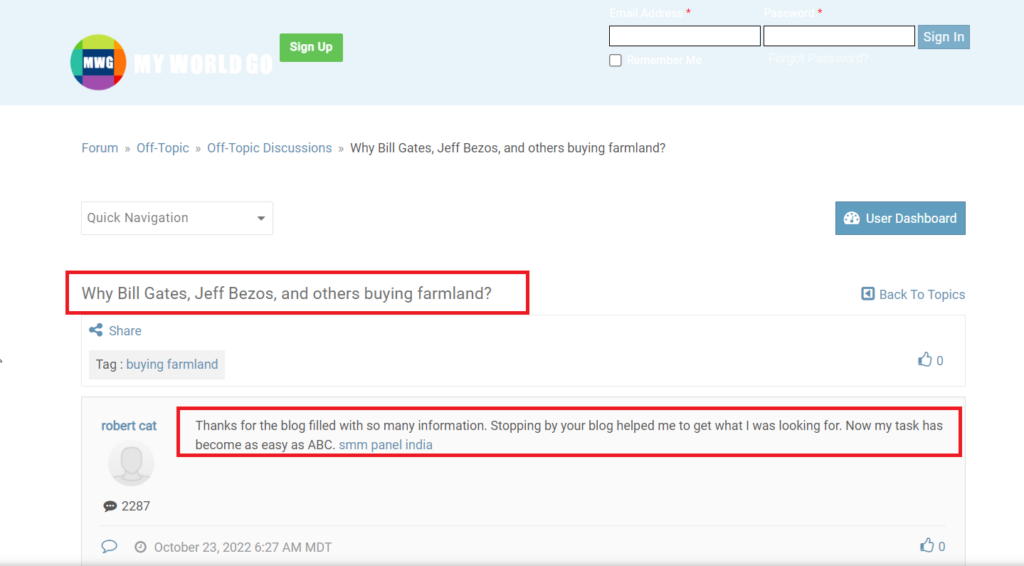
However, the comment below offers no clear answer, just a "wanna-be-natural" thank-you sentence and a dubious link. Again, completely irrelevant to the topic of discussion.
Low-quality directory links
Low-quality directory links are basically irrelevant links from online directories that don't really help users or search engines much.
Here's why you often come across unnatural links in places like this:
- Low-quality directories accept any website without checking content quality or relevance, often including those with unnatural linking practices.
- Some low-quality directories operate as paid linking schemes where website owners pay for listings to manipulate search rankings.
- Many low-quality directories are abandoned over time, leading to links that point to outdated or irrelevant content, thereby reducing their credibility.
💡Pro-tip! Low-quality directories cram pages with numerous unorganized links, devaluing listed websites and potentially manipulating search rankings.
Check out how messy this directory looks!
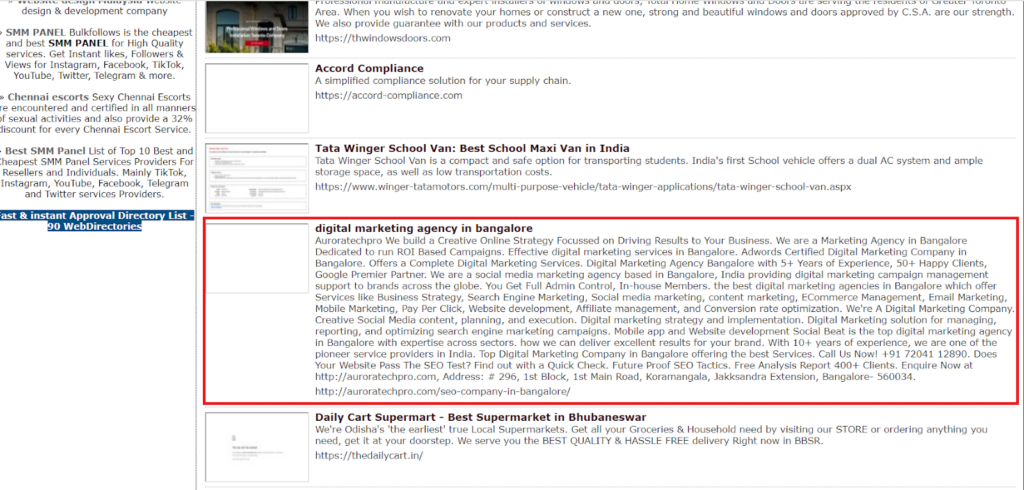
To top it off, many low-quality directories promote similar irrelevant directories, enticing users with quick and easy link-building opportunities.
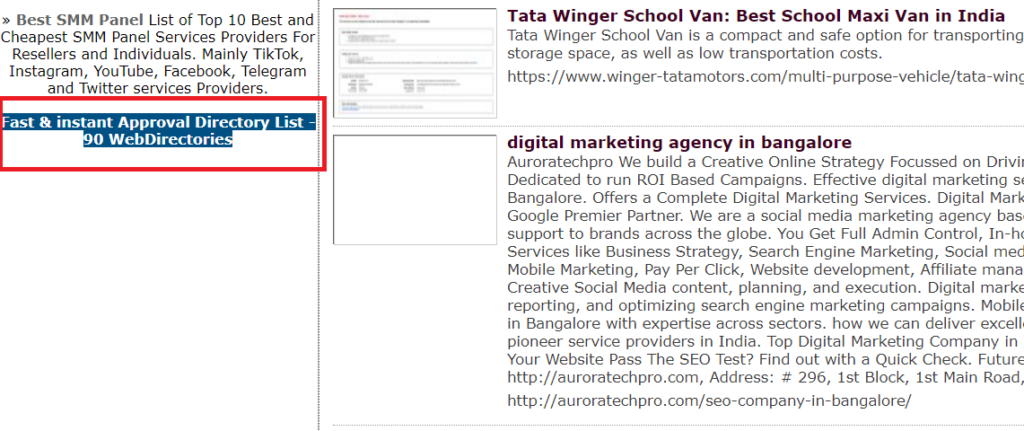
After clicking, everything looks just the way I expected!
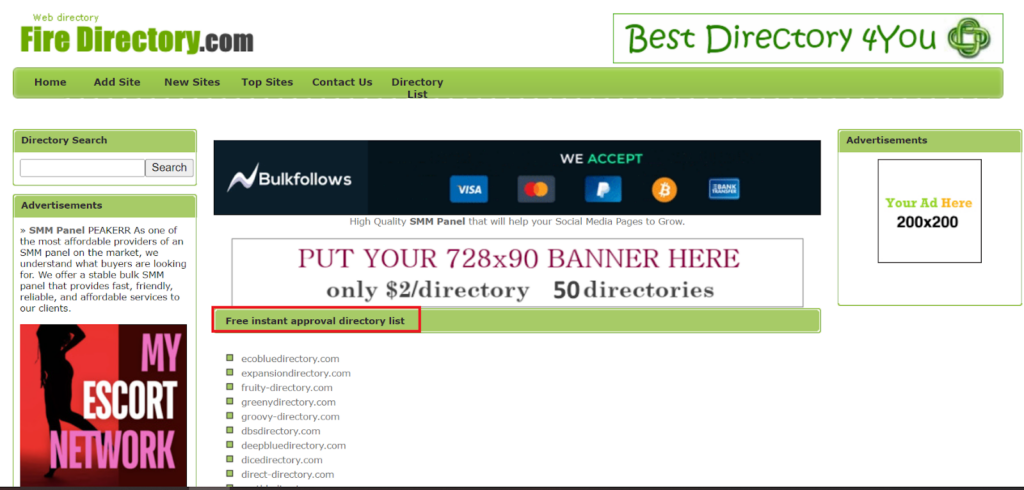
Link farms
Link farms are interconnected networks of websites composed entirely of unnatural links redirecting to random sites and irrelevant content. These links provide no value to users and are created solely to artificially boost visibility through mutual linking among the network.
In ethical link-building terms, link farms are services offered by blackhatters to profit from businesses without delivering any meaningful results. Avoid them at all costs — you'll see no benefits and will only waste your money.
💡Pro-tip!
You can easily identify unnatural links from link farming schemes using Ahrefs. Links generated from farms often exhibit similar numbers of referring domains, similar (DR), and low traffic metrics.
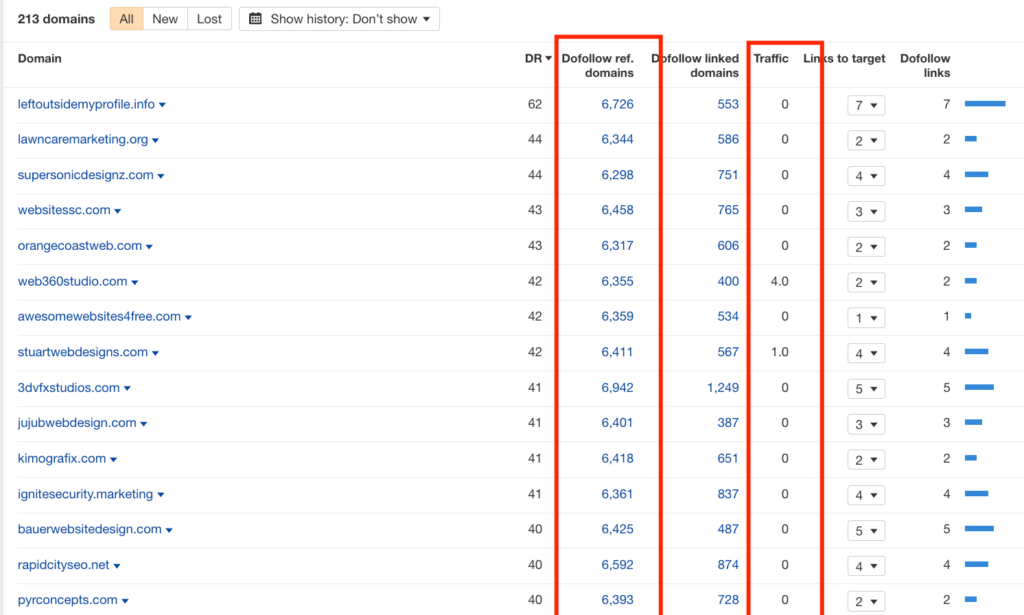
PBN links
PBN links are unnatural links generated by Private Blog Networks (PBNs), which are groups of websites owned by a single "parent website." They interlink to mimic organic links, aiming to manipulate search engine algorithms and falsely gain credibility from users.
PBN linking closely resembles link farms, although PBNs primarily redirect to external websites, whereas link farming focuses on backlinks within its own network.
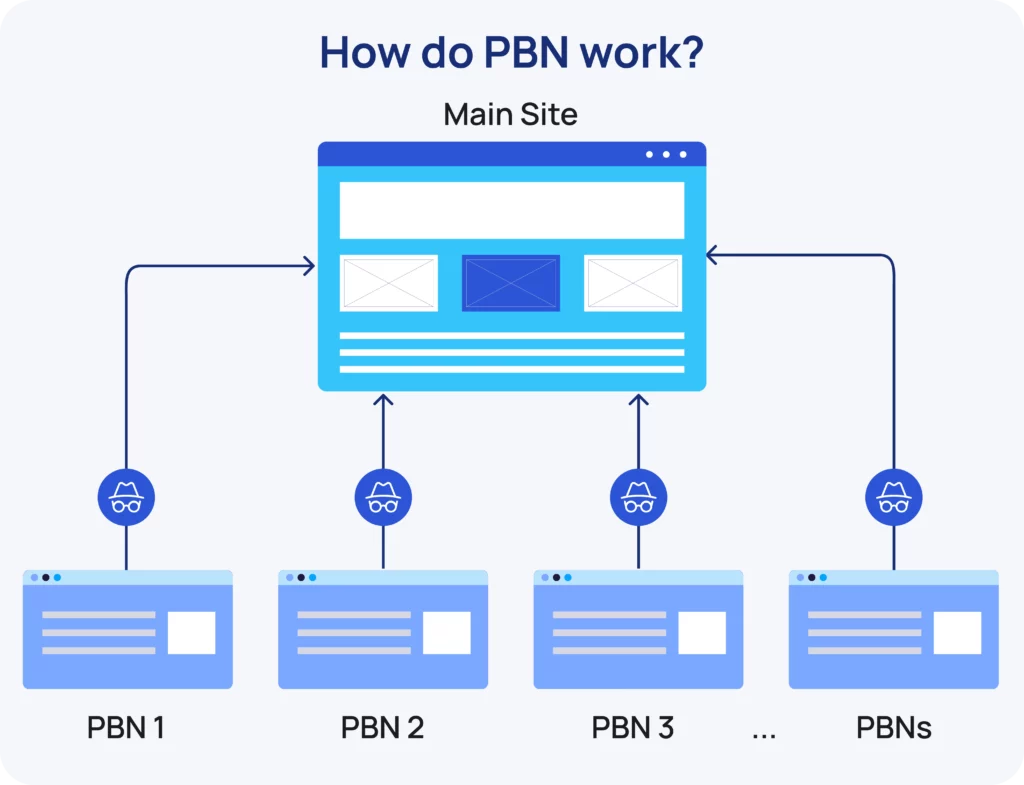
Here's an easy way to spot an unnatural link supposedly coming from a PBN: Use Ahrefs Site Explorer and look for:
✅ High DA/DR
✅ Low page traffic
✅ And, most importantly, shared IP!
As an example, let’s explore smartseolink.org with Ahrefs Site Explorer to check for unnatural PBN links.

As mentioned in our criteria, the DR is relatively high, but page traffic is zero. Let's check the backlinks to identify any suspicious linking.
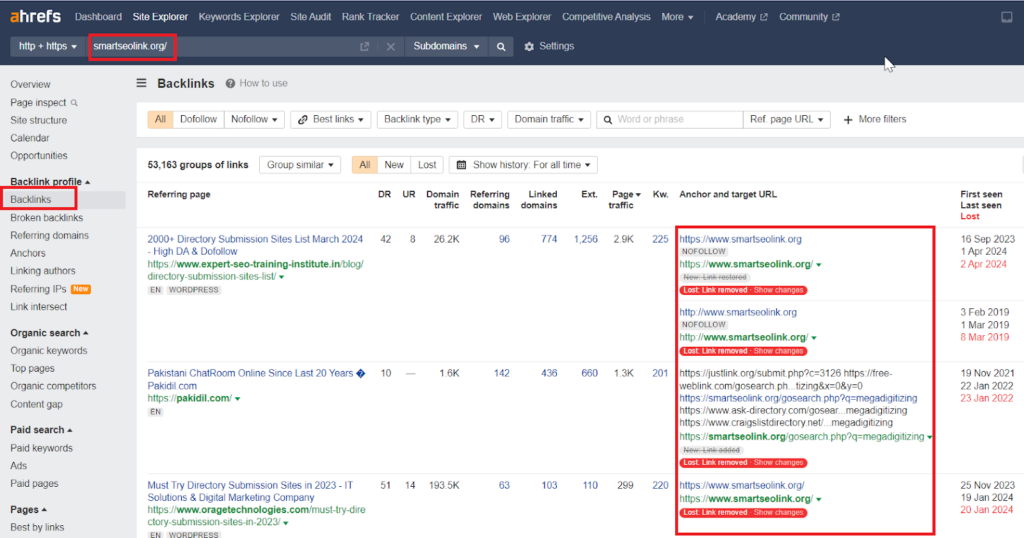
Many of the links were removed, however, the following got my attention:
- link-man.org
- freeseolink.org
- justlink.org
Now, let's use Ahrefs Quick Batch Analysis to check if all four websites share the same IP, a key sign of an unnatural pattern like a PBN.
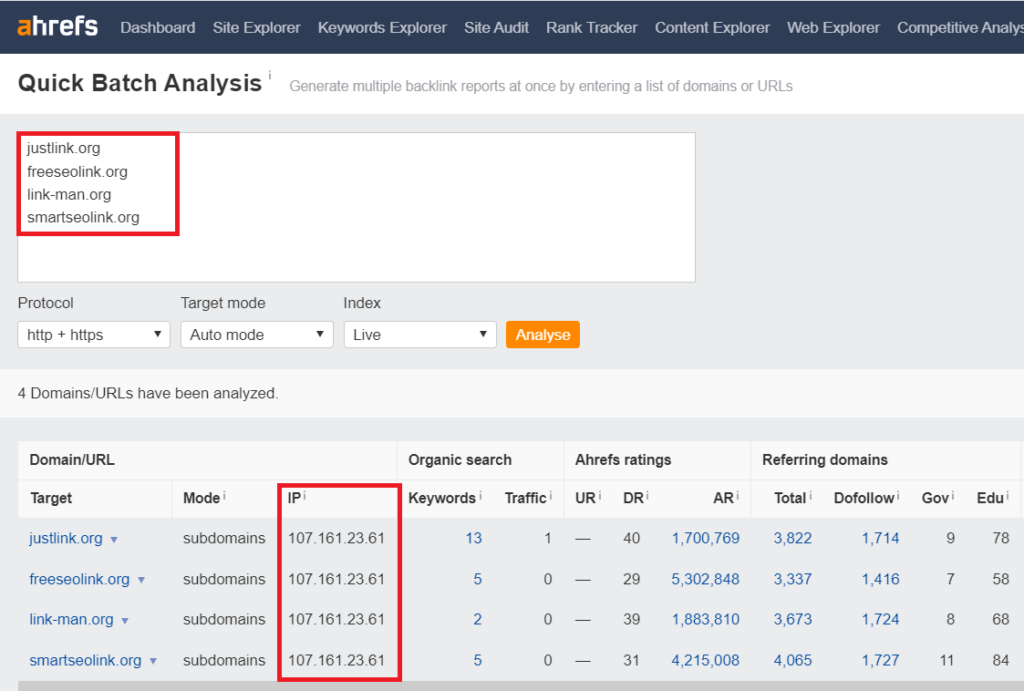
Yep, an alleged PBN detected!
🎤 Ask an expert!
"In your opinion, what’s the fine line between a strategic link-building campaign and an unnatural link scheme?"
The fine line between the two is soliciting the wrong link provider. If the link provider is also catering links to many other domains, then its value is not only minimally bad. It can also have the same adverse effect as a PBN¨
Blog comments
Blog comments, much like forum comments, aren't typically harmful unless they include unnatural links such as spam, irrelevant redirects, or keyword stuffing.
Once more, because blogs, especially less popular ones, lack editorial oversight, spammers freely infest them with their links without consequence.
Check out this cozy private blog where the author shares tips on living with an English host family.

Most readers leave warm, supportive comments related to the article's topic and share their thoughts. However, the last comment is completely spammy, irrelevant, and includes an unnatural link.
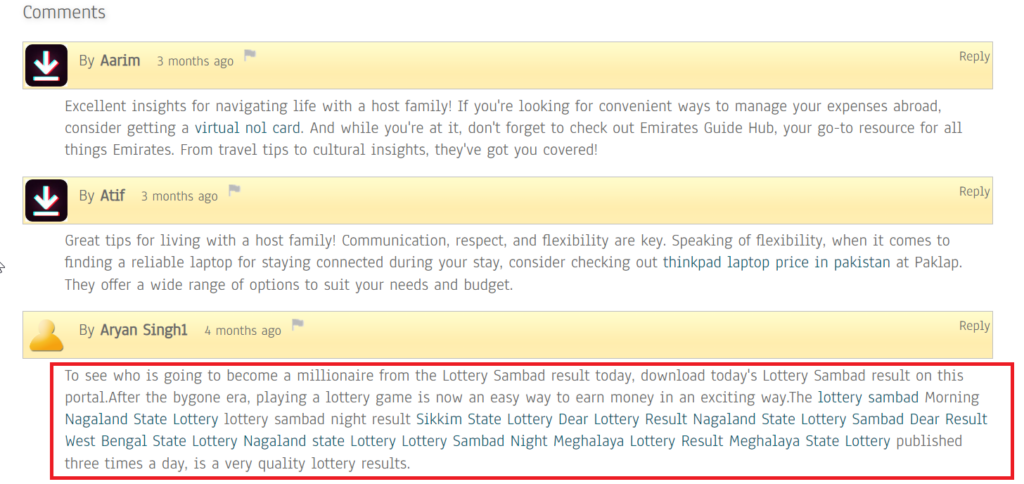
💡Pro-tip! For a natural and lasting boost to your link, focus on blogger outreach and collaborate with reputable bloggers who share your target audience. Links on low-quality blogs can easily get lost amid spam and neglected pages.
Expired domains/301 redirects
Expired domains, also known as 301 redirects, aren't unnatural links per se, however can be misused by blackhatters to redirect to unnatural links.
🧐 How it works?
When a domain expires, it might be bought by someone else. If the expired domain has existing backlinks, black hat SEO folks might buy it and redirect its traffic and link juice to any site they want ("301 redirecting").
When 301 redirects are used to pass PageRank from unrelated or spammy domains solely for manipulating search engine rankings, it can be seen as an unnatural linking scheme.
Here's how it might appear when using the Ahrefs backlink review tool.

In this example, millionairemansion.co.uk, which has an article about a millionaire mansion contest, links to an online casino through a 301 redirect. It seems like black hat tactics might be at play here.
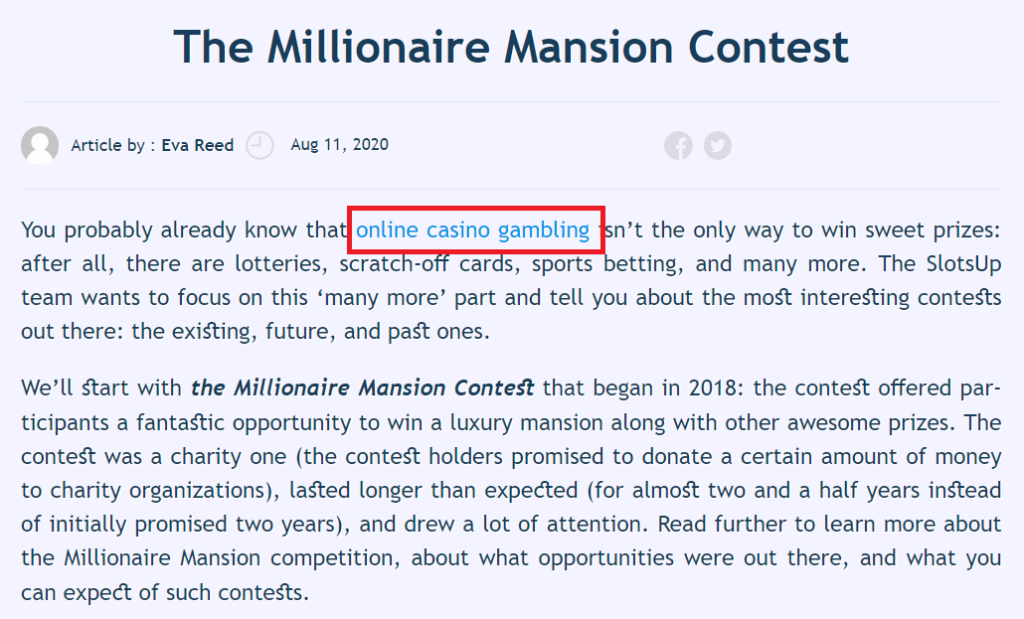
Injected links
Injected links are sneaky additions of unnatural links made by spammers and blackhatters to a website without the owner's permission. They're used to promote their own websites, services, or products.
Often, these links fly under the radar until the website owner gets a penalty or warning.

🧐 How it works?
- Spammers might slip in spammy keywords, especially on high-ranking pages in search engine results.
- Another trick is when unnatural links are secretly inserted into website pages. When your users click on these links, they get redirected to unsolicited or spam websites.
- Sometimes, hackers insert unnatural links directly into your database. Later, they send spam emails to your customers or users, turning it into a phishing attack.
- They can also create a bunch of new web pages on your website that you never asked for.
- Alternatively, blackhatters inject unwanted ads or banners directly to your website pages.
💡Pro-tip! One trick spammers use is to hide unnatural links off the visible part of your website, including in posts or page headers.
The most common scenario is when an injected link is embedded in the website code.
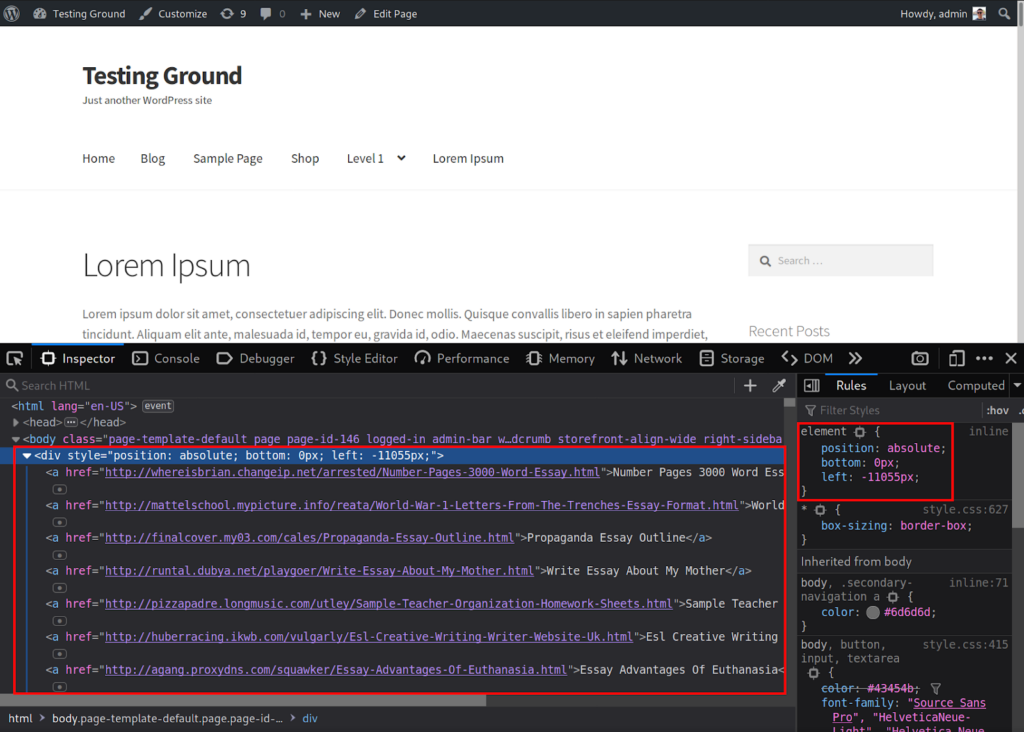
Of course, humans won’t see the unnatural links, but crawling bots that read the website’s HTML will — and these bad links will be counted as part of your website. That's a big no-no.
And here’s how a website with injected unnatural links will appear in Google search results.
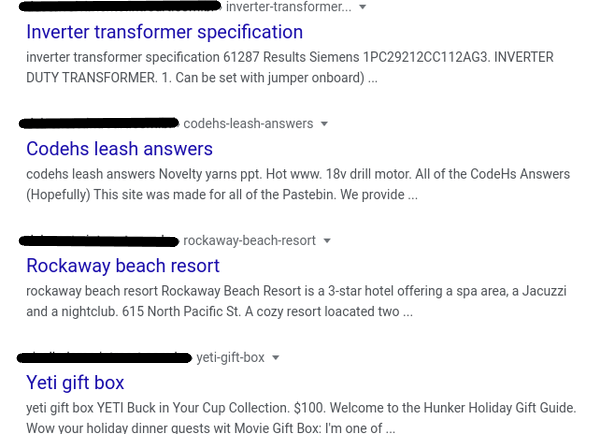
You can remove injected unnatural links in two ways:
- Automatically, using a security plugin or Google Search Console alerts;
- or manually, by regularly scanning and cleaning up your site and database, checking source code, and listening to user feedback.
Press releases & syndicated content
Press releases, like syndicated content distributed to various publishers, are a legit way to earn natural backlinks. However, blackhatters can take advantage of them to manipulate rankings and boost link juice unnaturally.
🧐 How it works?
- Syndicated content and press releases can end up on numerous low-quality or irrelevant websites that exist mainly to host such content. These sites often lack editorial oversight and focus more on boosting rankings rather than delivering valuable content.
- If a press release or syndicated content appears verbatim on many websites without significant changes, search engines might see it as duplicate content.
💡Pro-tip! Duplicate content can water down the value of links and may even lead to penalties if it's seen as an effort to manipulate rankings.
- If a press release or syndicated content causes a sudden and unnatural surge in links to a website, it can raise red flags for search engines. Natural link growth usually occurs gradually, whereas abrupt spikes may suggest artificial manipulation.
Finding duplicate content on your site is straightforward with tools like Ahrefs Site Audit or Webmaster Tools.
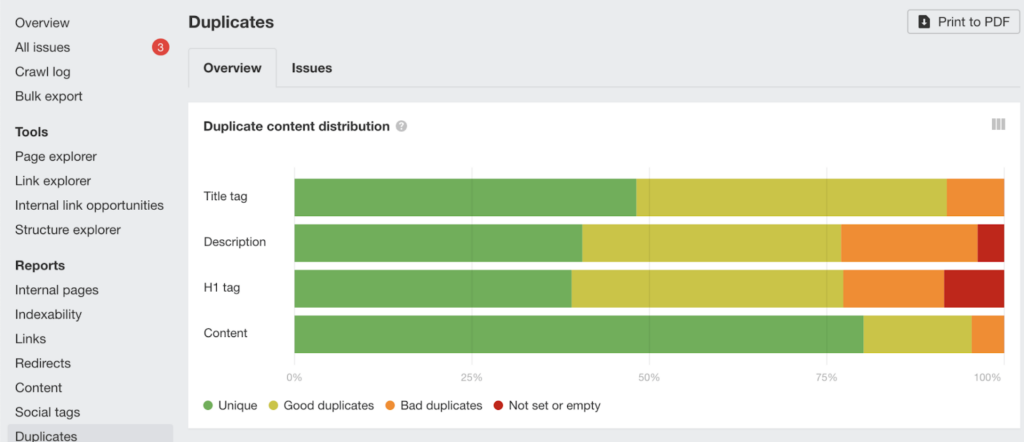
Profile links
Profile links are links you might find on forums, social media, or other sites where users can create accounts and add their website URLs. They're often used to boost rankings by passing on link juice, but search engines can see them as unnatural.
Sure, we all share links on our social media profiles, but spammers take it to another level by adding lots of links from one source or multiple accounts owned by the same person. This can suggest they're using automated tactics to build links.
Other signs of unnatural linking include:
- Links placed in user profiles or forums where they don't match the context of the linked website or its content.
- Links with overly optimized anchor text that uses exact-match keywords instead of natural, varied anchor text.
Imagine you're scrolling through a forum's comment section and notice several comments that look strangely similar, all with dubious links. Despite claiming to be from different users, they were probably posted by just one person who created multiple accounts.
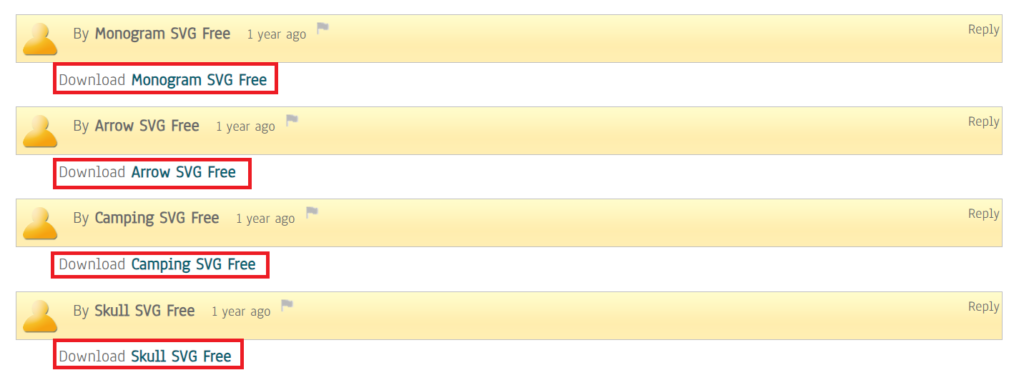
After clicking on the profile of one of the commenters, it's clear there's a suspicious link in their profile. Looks like the spammer has been caught again. Let's hope nobody clicks on this unnatural link.
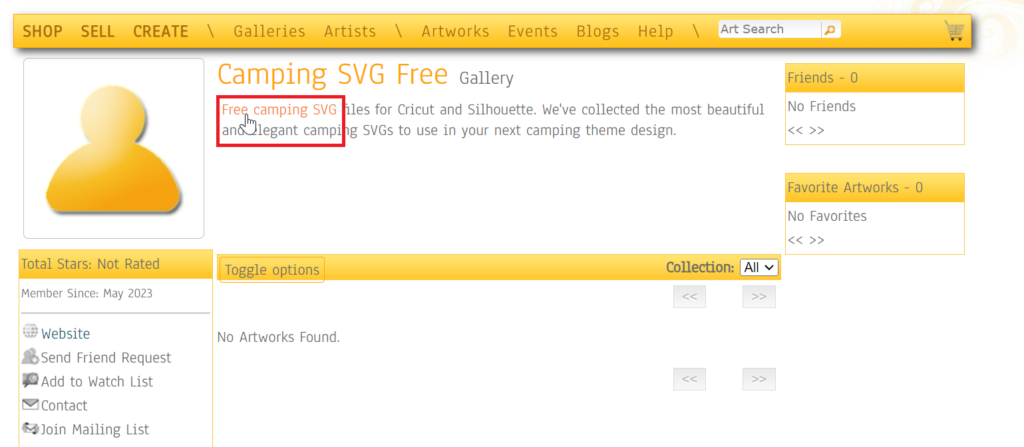
What to Do If Your Have Too Much Unnatural Links
No need to stress if you've been penalized; it happens to everyone at some point. You can definitely bounce back from it. Whether you're aiming to gain more control over unnatural links or just want to stay on the safe side, these simple tips will help you out.
Hire a professional link-building agency
Whether you're a newcomer navigating the complexities of unnatural links that can harm your business, or a seasoned enterprise reliant on consistent traffic and top rankings, hiring a professional link building agency is a smart investment. It's a proven modern approach to safeguard against unnatural linking issues without wasting valuable time.
And here’s why:
- Reputable link-building agencies specialize in premium link-building services through trusted relationships with website owners, administrators, and editors. This guarantees high-quality, authoritative links obtained naturally, eliminating any issues with unnatural links.
- Professional agencies are equipped with the experience and tools to conduct comprehensive link audits. They can effectively pinpoint unnatural or spammy links that may be detrimental to your site's SEO.
- If unnatural links are detected, agencies adeptly utilize search engines' disavow tool. This tool instructs search engines to disregard specified links when evaluating your site's ranking, ensuring effective SEO management.
- Most reputable link-building agencies offer clients a customized link-building plan, providing a clear roadmap to acquire links naturally while avoiding penalties.
Need a reputable link-building agency with industry expertise, a proven track record, and extensive experience in handling unnatural links? Let Editorial.Link do the job! From quality link acquisition from reputable websites to backlink audit and planning, your SEO security, reputation and ranking is in the right hands.
However, if you feel like you have enough stamina to do it on your own, scroll down for more tips!
Conduct regular backlink audits
First, you'll want to use link building tools like Google Search Console, Ahrefs, SEMrush, or Moz. These are handy for analyzing your website's backlinks. If you don't have access to these tools, consider starting with Google Search Console, as it's free and provides valuable insights.
Sift through unnatural links
To spot the bad ones, keep an eye out for:
- Links coming from totally unrelated sites or ones that have zero to do with your biz;
- Those paid links that try to boost your search cred (they’re after that PageRank juice);
- Links from shady link farms or automated link-trading setups — they're not your best SEO choice;
- And watch out for those over-optimized anchor texts, packed with too many exact-match keywords. They might look good, but they're not foolin' Google!
Inform webmasters
When it comes to managing unnatural links that you can control (like those from link schemes or paid placements), the first step is to reach out to the webmasters of the linking sites. Politely ask them to remove the links in question.
Be sure to give them specific details about which links you're concerned about and why they should be removed. This helps ensure your site stays in good standing with search engines and maintains a positive online presence.
Leverage disavow tool
If you encounter links that you can't remove on your own, and contacting the website owners hasn't worked, you can use Google’s disavow link tool in Google Search Console. This handy feature tells Google which links to ignore when ranking your site, keeping you safe from unwanted associations.
All you need to do is put together a list of suspicious, unnatural links in a text file.
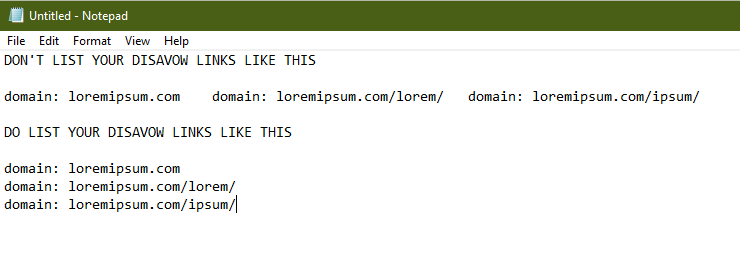
Next, just go to the disavow tool and select your website from the dropdown menu.
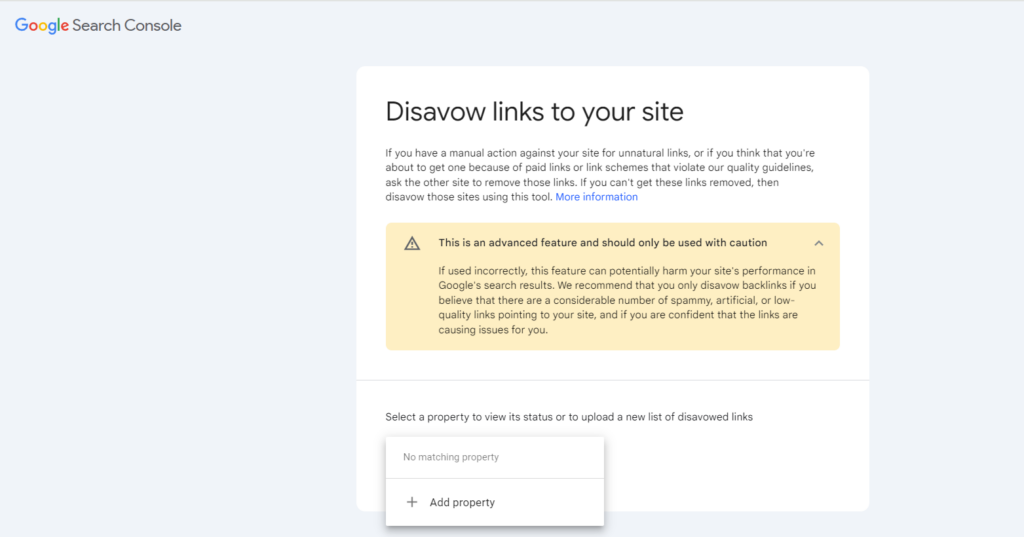
Finally, submit your links by clicking "disavow links."
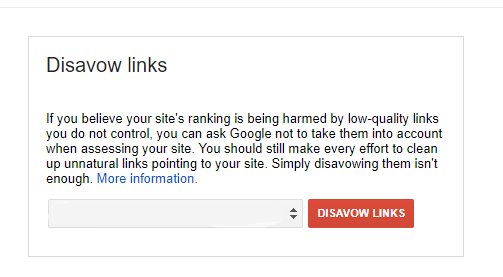
🎤 Ask an expert!
"What’s your protocol for dealing with a sudden drop in rankings due to suspected unnatural links?"
If there is unnatural link building occurring and it appears to be tanking my site, the best tool right now is the Disavow for Google. If they are attacking a certain URL, you could definitely change the URL of the page and try to diminish the attack that way. If it is possible to contact the domain owner or at least the hosting provider, that would be a first choice but many times is difficult.
💡Pro-tip! As you can see, the Disavow tool is a common practice among SEO experts when dealing with unnatural linking. However, it's not universally adopted across the SEO community.
According to our recent survey of 113 SEO experts worldwide, only 31% use the Disavow tool, while 69% do not.
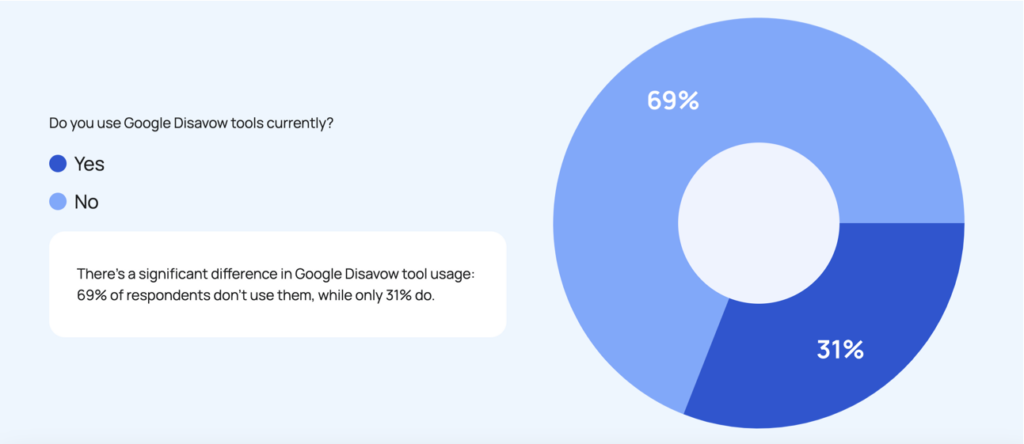
Natural link-building first
Stay relaxed and open-minded, but ensure ethical practices and adhere to proven methods of link-building:
- Focus on producing top-notch content that naturally garners links;
- Deepen ties with influencers and fellow industry websites;
- Contribute guest posts to respected platforms;
- Regularly monitor your backlink profile to promptly identify any suspicious links.
Track changes & follow guidelines
Once you've completed these steps, make it a habit to keep an eye on how your website is doing and check your backlinks regularly. Look out for any strange new links that might pop up. Tools can really help with this — they'll show you how your rankings and traffic are changing.
And don't forget to always follow Google’s Guidelines. They're there to help you steer clear of any penalties down the road. Good luck!
🎤 Ask an expert!
“How do you future-proof your link-building strategies against potential algorithmic penalties?”
I think people get caught up in the idea that all links are created equal. They’re not. The recent Google link update basically confirms that the only links you should be building are relevant and highly trafficked links. So a link on a random website won’t benefit you at all. But a link on Hubspot that’s actively sending you traffic will provide you with the most value.
By focusing on the reader. Would it make sense for them to come across a link on health insurance in an article on marketing strategies? Would it benefit them in any way? If your answers are “no” – it’s an unnatural link you should skip.
Most of the link building that I’m performing now is through press releases and sponsorships and a very selective process for outreach. I do keep a close eye on doing too much press because they are generally no follow and you do have to keep in mind what the no follow and follow ratio is.
As you start realizing that brand recognition and brand marketing is an essential part of SEO nowadays, you will acquire links naturally and Google will reward you for that.
Final Words
Hope all that info didn't put you to sleep! Now armed with the knowledge and tools, you're in control to tackle unnatural links, boost your rankings with confidence and avoid SEO flagging.
Remember, unnatural linking isn't some random stroke of bad luck — it's something you can actively prevent. While others might try to profit from it, sticking to ethical link-building is your best defense.
And if you ever need a hand, Editorial.Link is here to support you every step of the way!




